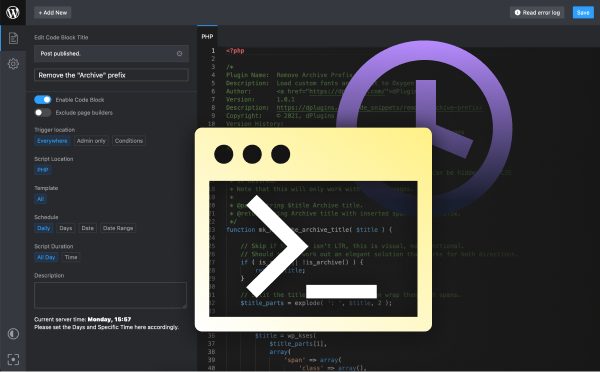WordPress Filter Hooks are a powerful and versatile tool for developers to extend and customize the functionality of WordPress. They allow developers to modify data and output generated by WordPress, making it easy to customize the user experience on your website. Filter Hooks can be used to add, modify or remove data from WordPress core functions, or to create new functions. With WordPress Filter Hooks, developers can create custom functions to modify the output of a WordPress theme or plugin, or create their own custom functions to add new features to a WordPress website.
Utilizing WordPress Filter Hooks to Extend Your Theme Functionality.
Are you looking for a way to extend the functionality of your WordPress theme? Filter hooks are a great way to do just that. Filter hooks are an essential part of the WordPress core and can be used to modify or extend existing core functions, plugins, and themes. Filter hooks are an integral part of the WordPress API, allowing developers to alter the existing functionality of a plugin or theme without having to directly modify the code. This makes it easier for developers to customize and extend the functionality of a theme without having to understand the underlying code. Filter hooks are simple to use and can be used to make minor modifications or major changes to the way a theme functions. For example, you can use a filter hook to alter the output of a function, add custom HTML to the page, or even modify the query parameters of a query. Filter hooks are also a great way to add custom functionality to your theme. For instance, you can use filter hooks to add custom post types, taxonomies, and more. You can also use them to create custom fields and widgets, or even add custom shortcodes to your theme. Using filter hooks to extend the functionality of your theme is an easy and effective way to customize your theme and make it unique. With filter hooks, you can easily extend your theme’s functionality without having to learn complex programming languages. Filter hooks are also a great way to keep your theme up to date with the latest features and changes in WordPress. By making simple changes to your theme with filter hooks, you can ensure that your theme will always be up to date and compatible with the latest versions of WordPress. Filter hooks are an essential part of the WordPress API and are a great way to extend the functionality of your theme. Whether you’re looking to make minor modifications or major changes to your theme, filter hooks are the perfect way to do so. So get out there and start experimenting with filter hooks to see what kind of amazing new features you can add to your theme!
5 Essential WordPress Filter Hooks for Optimizing Your Website Performance.
If you’re looking for ways to optimize your WordPress website for better performance, one great place to start is with filter hooks. Filter hooks are a powerful tool in WordPress programming, allowing developers to “hook” into existing code and make modifications or additions. By leveraging the power of filter hooks, you can optimize your WordPress website for performance, security, and customization.
Here are five essential filter hooks that every WordPress developer should be familiar with:
1. wp_default_scripts – This hook allows you to add or modify the default scripts included with WordPress. You can use this hook to remove or replace outdated scripts, or to add custom scripts that improve the performance of your website.
2. wp_default_styles – This hook allows you to add or modify the default styles included with WordPress. You can use this hook to remove or replace outdated styles, or to add custom styles that improve the appearance and performance of your website.
3. pre_get_posts – This hook allows you to alter the main query before it is executed. You can use this hook to modify the query parameters and optimize the performance of complex queries.
4. post_limits – This hook allows you to modify the number of posts displayed on a single page. You can use this hook to reduce the number of queries performed and improve the performance of your website.
5. wp_head – This hook allows you to add custom elements to the
How to Build a Custom WordPress Plugin with Filter Hooks.
Creating a custom WordPress plugin can be a great way to add new features and functionality to your website. With the help of filter hooks, you can do even more. Filter hooks allow you to modify existing WordPress core functions, such as outputting content, without actually modifying the core code. This makes it easier to maintain the plugin and keep your site running smoothly. In this article, we’ll show you how to use filter hooks to build your own custom WordPress plugin. Let’s get started! First, you’ll need to create a new plugin folder and create a .php file within the folder. You’ll also need to add a header comment to the top of the file that includes the plugin name, description, author, and version. Next, you’ll need to write the code for your plugin. You’ll need to register and hook the filter using the add_filter() function. This will enable your plugin to modify existing WordPress core functions. You can then write the code for your plugin’s functionality. This can include anything from changing the output of a post title to adding new functionality to the admin dashboard. Be sure to include the apply_filters() function so that your plugin’s changes are applied. Finally, you’ll need to activate your plugin. You can do this by going to the Plugins page in your WordPress dashboard, selecting your plugin, and clicking the “Activate” button. Congratulations! You’ve just created a custom WordPress plugin with filter hooks. With the help of filter hooks, you can easily modify existing WordPress core functions without actually modifying the core code. This makes it easier to keep your site running smoothly and maintain your plugin.
WordPress Filter Hooks are an incredibly powerful tool for developers and site owners alike. They enable developers to quickly and easily modify the output of WordPress functions and plugins, allowing them to customize their website and create unique experiences for their users. With a wide range of filters available, developers can customize almost any aspect of their website, from formatting to content and beyond. For these reasons, WordPress Filter Hooks are an invaluable tool for any WordPress developer.


